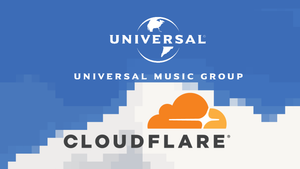Germany’s top court is reviewing a long running legal battle between Universal Music and Cloudflare, the technology company that is an increasingly important part of how the internet functions - and which sprang to popular attention recently as the result of a major outage that took down a huge number of high profile websites and services.
As part of the ongoing faceoff between the two companies, German judges have now asked the European Union courts to consider two key questions that could have a wide ranging impact on the music industry’s fight against online piracy.
The German judges want their EU counterparts to rule on whether simply linking to an infringing music file constitutes “making that file available” in copyright terms, as well as guidance on more complex issues around how they should assess the legal liabilities of so called ‘content delivery networks’, or CDNs.
CDNs, like the one operated by Cloudflare, effectively create and host a copy of a website to help ensure spikes in traffic don’t stop users from being able to access it, and to make access to sites faster and more efficient. Cloudflare describes its CDN service as “a geographically distributed group of servers that caches content close to end users”.
These two crucial copyright questions were submitted to the European courts in August and then published earlier this month in an EU journal spotted by Torrentfreak.
They relate to a legal dispute that began in 2020. Universal wanted Cloudflare to block access to the website of music piracy service DDL-Music, which used the Cloudflare CDN.
Web-blocking orders like this - where courts order internet companies to block access to copyright infringing websites - have now been a key anti-piracy tactic used by the music industry for years.
Originally the web-blocking orders were secured against internet service providers, but more recently music companies have started to ask courts to order web-blocks against other kinds of internet services, including CDNs and DNS resolvers, both of which are services offered by Cloudflare.
Universal successfully secured a web-blocking order against the Cloudflare CDN through the German courts in 2020, resulting in DDL-Music being blocked. However, Cloudflare then appealed that decision, while Universal sought to get a second web-block against Cloudflare’s DNS resolver 1.1.1.1, which is used by many consumers to speed up and secure their own internet access.
On appeal, the Cologne Higher Regional Court upheld the web-block against Cloudfare’s CDN, but ruled that web-blocking obligations did not extend to 1.1.1.1, because it was a mere intermediary service.
At the time Cloudflare welcomed the ruling on its DNS resolver, but quickly raised an appeal against the CDN web-blocking order in Germany’s Federal Court Of Justice, which is where the case is now being reviewed.
The first question being asked of EU judges by the top German court relates to the liabilities of DDL-Music itself. DDL-Music didn’t host any pirated music, it linked to music files stored on other servers.
There have been lots of piracy legal battles against websites or services that don't actually host copyright infringing music, but which instead link or connect the user to that content. In some cases, the music industry has successfully argued that while a piracy service didn’t directly infringe copyright, it was nevertheless liable for so called ‘authorising’ or ‘contributory’ copyright infringement.
However, in some European cases the courts have actually ruled that simply linking to an unlicensed music file constitutes making that content available, and as 'making available' is an exclusive right of the copyright owner, sites linking to pirated content are directly liable for copyright infringement. The German judges want EU judges to clarify exactly how European law views this matter.
The question relating to the liabilities of content delivery networks - like Cloudflare’s CDN, which stored cached copies of DDL-Music’s website - is about establishing whether or not Cloudflare is liable for copyright infringement because it basically held and published a copy of the site.
European law provides safe harbours for companies that operate networks that ‘cache’ - so temporarily store - third party content, which means those companies cannot be held legally liable for that content. Cloudflare believes it is covered by those safe harbours. Universal argues otherwise, noting that content can sit on Cloudflare’s CDN for up to a year which, as far it’s concerned, isn’t temporary.
Ultimately, it is Germany’s top court that will make the final ruling on this matter in the context of the Universal lawsuit, but it wants guidance from the EU courts about how it should decide if Cloudflare is liable for making the pirated content available, and whether it is protected by the caching safe harbours.
Whatever the German courts decide, because of the importance of EU law in regard to their decision, the ruling could inform the music industry’s battle with piracy across Europe, in particular as it seeks to pressure a wider range of internet services to play their part in blocking and removing unlicensed music online.

